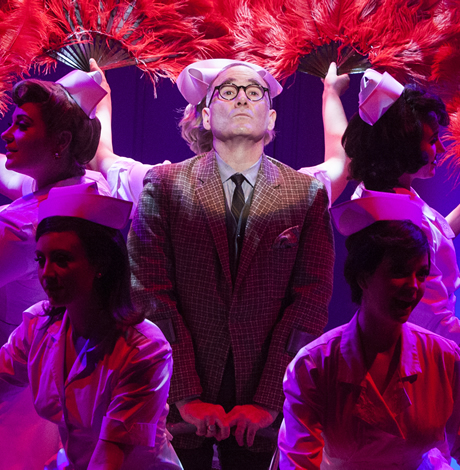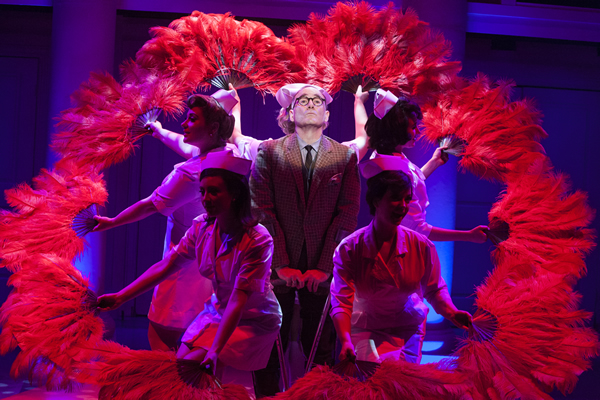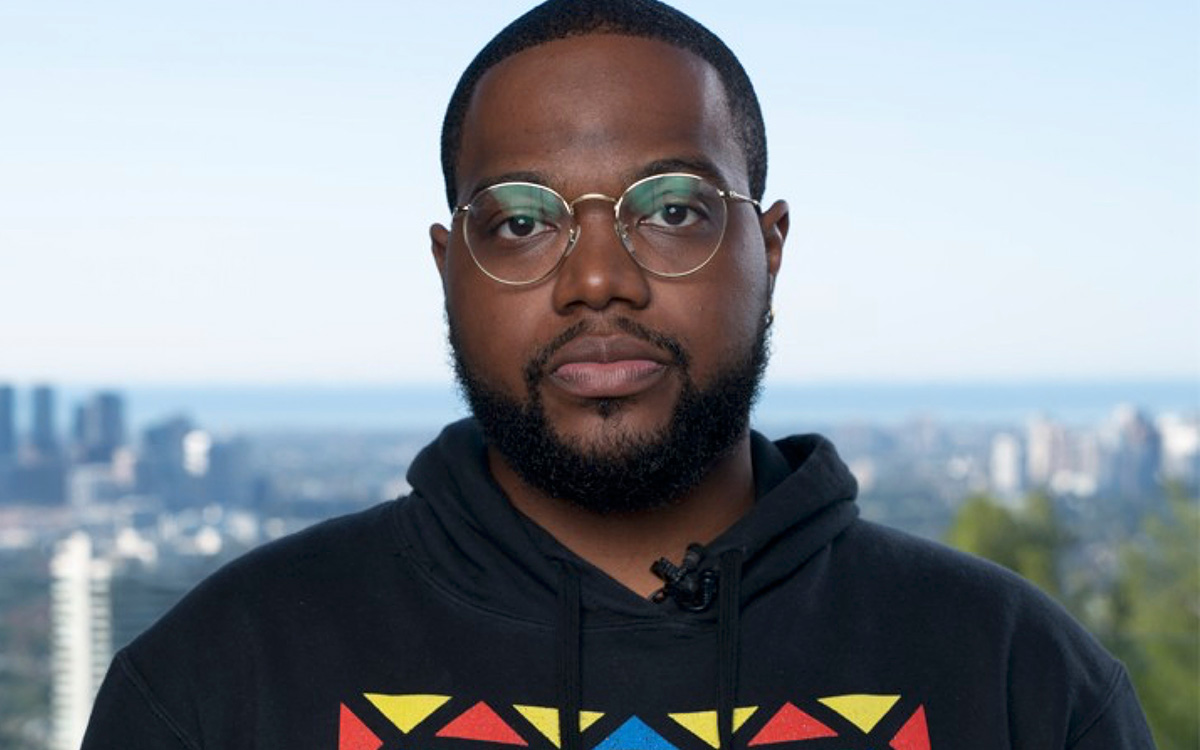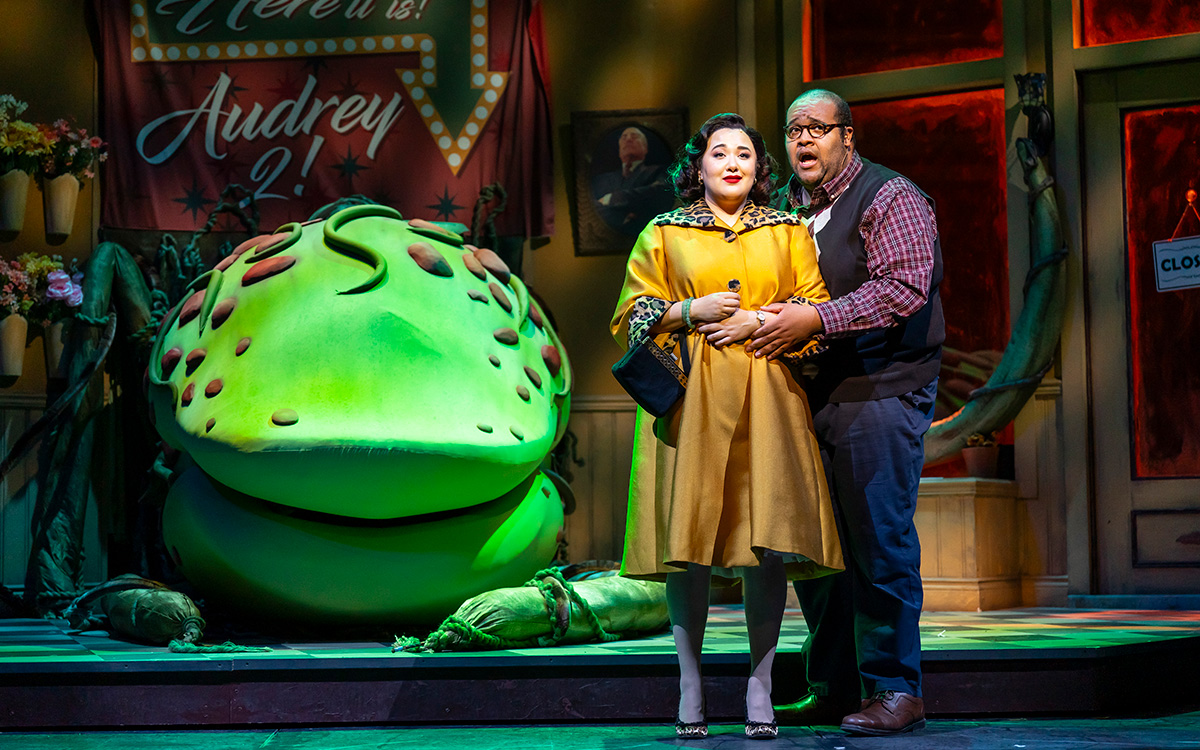Theater
‘The Fix’ gets reborn at Signature
Political musical mostly works despite weak libretto


Lawrence Redmond (Grahame Chandler) and the cast of ‘The Fix’ at Signature Theatre. (Photo by Christopher Mueller)
‘The Fix’
Through Sept. 20
4200 Campbell Avenue, Arlington
Tickets start at $40
703-820-9771
“The Fix,” a musical about the underbelly of American politics, got its start across the pond. Originally titled “Cal: A Musical Tale of Relative Insanity,” this story of a profligate scion whose Machiavellian family pushes him into the political limelight, premiered in London in 1997.
A year later, a renamed and reworked version staged by out director Eric Schaeffer opened stateside at Signature Theatre in the company’s garage space. Now it’s back at Signature (in far grander digs), further tweaked and again helmed by Schaeffer.
The action begins kicks off with Sen. Reed Chandler (Bobby Smith) croaking in flagrante delicto underneath a hooker. Eager to maintain power, his ambitious widow Violet (Christine Sherrill) and advisor brother Grahame (Lawrence Redmond), whose own political career was waylaid by polio (don’t tell FDR that), conspire to make something of the Senator’s prodigal son Cal (Mark Evans), a ne’er do well who’d gladly spend his future smoking weed in his bedroom in the family home.
After an intensive overhaul that includes a stint in the armed services, wardrobe changes, instruction from a chain-smoking voice coach (Tracy Lynn Olivera), and marriage to a dim debutante (Jessica Lauren Ball), Cal is pushed into the political arena with an eye on eventually reaching the White House. But drugs, women, dirty politics, mob connections and a modicum of integrity get in the way.
Despite what may sound like a juicy storyline, “The Fix” suffers from a severely thin libretto penned by John Dempsey. And while Signature’s website warns about the show’s adult language, sexual content, drug use and smoking, it would do better to prepare audiences for cheap jokes that rarely land. Ideally a fix for “The Fix” would entail contacting the late master librettist Arthur Laurents via medium for a rewrite.
Still, Signature’s stalwart talents led by director Schaeffer deliver an entertaining evening with Matthew Gardiner’s vigorous choreography, Jon Kalbfleisch’s reliably stellar music direction, a vocally top notch 19-person cast and a strong design team including ubiquitous set designer Misha Kachman, who’s created a slick White House façade festooned with video screens alternately displaying incriminating photos, teleprompter copy and news updates.
At times evocative of “Evita” and “Chicago,” Dempsey (lyrics) and Dana P. Rowe’s (music) mostly pop-rock score with references to gospel, jazz and a little vaudeville, is impressively performed. Like the first act, the second features some unsatisfying exposition. But there are highlights: “Child’s Play,” a poignant moment of self-discovery, showcases Evans’ gorgeous voice and ability to act a song. Similarly, Violet’s “Spin” performed powerfully by Sherrill in underwear and a wig cap, shows cracks in her character’s villainy.
As Cal, square-jawed Evans embodies the prototype young up and comer. Sherrill and Redmond make great heavies, and Dan Manning is appropriately shady as family friend Anthony Gliardi — in short a mafia don. Rachel Zampelli gives a nuanced turn as Tina McCoy, an unsavory club singer who introduces Cal to heroin only to later complain that he values the drug over her. And out actor Bobby Smith displays his smooth song and dance man skills as the late, white-suited Senator who makes the occasional visit from the other side.
Early in the show, Violet calls Grahame, who uses a wheelchair, a “misshapen fag.” Other than an underlying sexual tension between him and his nephew Cal, Grahame’s sexuality isn’t explored. That they’re not related by blood is a small consolation. Though Violet touts her son’s noble bloodline, it seems his true father is tattooed death row inmate Bobby “Cracker” Barrel, played by out actor Will Gartshore who brightens the second act with a crowd-pleasing, jailhouse number, and leaves the audience wanting more.
The show’s timely ending is new. And without spilling the beans, it closes on an intriguing upbeat note that wasn’t there before.
Theater
Jessica Phillips shines in ‘Penelope,’ a ‘pandemic parable’
Alex Bechtel was inspired to write about loneliness, waiting, separation

‘Penelope’
Thorough April 28
Signature Theatre, the Ark
4200 Campbell Ave, Arlington
$40-$99
Sigtheatre.org
In the new musical “Penelope,” Broadway’s Jessica Phillips gives an unforgettable take on the title role torn from the pages of Homer’s “Odyssey” — more or less. Fortified by bourbon and backed by a Greek chorus of musicians, the character uncharacteristically steps out from the background to share her story surrounding two decades waiting on the island kingdom of Ithica for the return of her absent husband Odysseus.
Sometimes described as a “pandemic parable,” the 70-minute work is based on composer/playwright Alex Bechtel’s personal experience. While separated from his partner during COVID, he was inspired to write about loneliness, waiting, and separation, a subject Phillips was eager to tackle.
An accomplished Broadway actor and mother of two, Phillips, 52, is best known for memorable turns in “Dear Evan Hansen,” “The Scarlet Pimpernel,” “Next to Normal,” and “Priscilla Queen of the Desert.”
Two years ago, she made news for coming out as queer after having long been identified as straight. Parts of the theater scene were caught a bit off guard, but only momentarily. Now, she lives in New York with her partner Chelsea Nachman, a theatrical publicist.“We share the same professional community but in very different roles. I think that makes life easier for us.”
Currently enjoying an extended run at Signature in Arlington where the trees are in bloom, she spares time for a phone interview, starting off with“Perfect timing. I’ve just finished the last song on Beyonce’s ‘Cowboy Carter.’ Let’s talk.”
WASHINGTON BLADE: Increasingly, I hear artists report having been deeply changed by the pandemic. Did that have anything to do with your coming out in 2022?
PHILLIPS: Definitely. During the pandemic, those of us in the arts were in deep crisis, because our industry had collapsed in almost every way. At the same time, that space allowed us to be contemplative about where we were. For me, that period of time gave me the space to both come to terms with and confront those fears about saying who I was, out loud and publicly.
BLADE: Did you have professional concerns?
PHILLIPS: Oh yeah, I was specifically worried about perception. Not so much about being queer but more what it meant to have come out relatively late in life. I had some fear around whether people would take me less seriously.
At the same time, I was nervous about being fully transparent and worried about my privacy and being vulnerable. Like other women I knew, I was more comfortable dealing with traditional societal expectations in America. I grew up with those cultural expectations and thought of myself in those terms for a long time.
BLADE: What changed?
PHILLIPS: What’s been so freeing for me, I can confront how I took on those expectations and say I’m not going to let those determine how I live my life. I get to decide.
BLADE: There’s a lot of wonderful storytelling in “Penelope.” What’s been your way into that?
PHILLIPS: My way of moving through the show is allowing this character to experience all five stages of grief. Humor, slapstick comedy, bargaining, denial. And ultimately acceptance and deep grief.
When an audience is alive and invested, it’s palpable and elevates the storytelling. When an audience is having a thinking rather feeling experience that changes the tone of my storytelling and not in a bad way.
It’s interesting how much they’re a part of everything. It’s really intimate. The audience is just six feet away. It’s a unique experience and we’re on this ride together. And I find this to be a really beautiful and satisfying experience that I’ve not had before.
BLADE: After Signature, what’s next for “Penelope”?
PHILLIPS: That’s the million-dollar question. Hopefully we’ll take it forward to New York or tour it, but that requires willingness and money. I do think there’s a broad audience for this. It’s beautiful, unique, artistic, really emotional, and at the same time possesses an intellectual quality that’s missing from a lot of commercial theater these days.
BLADE: And what’s next for theater?
Phillips: I think one good thing that came out of the pandemic is that people like Alex Bechtel had an opportunity to create. In the next decade we’re going to see the results of that. I think we have some extraordinary things to look forward to. If a work like “Penelope” is any indication, we’re all in for something really good.
Theater
‘Nancy,’ soaked in ‘80s nostalgia, is ‘queer AF’
Mosaic production led by out director Ken-Matt Martin

‘Nancy’
Through April 21
Mosaic Theater Company at Atlas Performing Arts Center
1333 H St., N.E.
$53-$70
Mosaictheater.org
Set in 1985, smack dab in the middle of the Reagan years, Rhiana Yazzie’s “Nancy” is totally soaked in nostalgia: shoulder pads, high hair, Van Halen, etc. For some theatergoers, it jogs the memory and for others serves as an introduction to an alien era.
Out director Ken-Matt Martin describes the production (now at Mosaic Theater) as “queer AF.” He continues, “But that’s true with everything I touch. My aesthetics and interests are unapologetically queer. When you first walk into theater, you see a big ass picture of Nancy’s face. The whole play is kind of set on her face.”
Martin, who puts his age as “somewhere over 30,” gives a brief rundown via telephone: “‘Nancy’ places two women on parallel tracks and we get to watch them on a collision course. Esmeralda [Anaseini Katoa], a Navajo mother and advocate determined to improve the condition of her family and reservation. Her story is juxtaposed to that of Nancy Reagan [Lynn Hawley] who’s busy at the White House consulting with society astrologer Joan Quigley to help guide Reagan [Michael Kevin Darnall] and his administration. The women’s worlds come together over Nancy’s direct ancestral connection to Pocahontas.”
The busy storyline also includes a moment surrounding Rock Hudson’s final days, a moment when well-coiffed, clothes-crazy Nancy was presented with the opportunity to make a difference but chose not to.
“And the work doesn’t let Nancy off the hook,” adds Martin. “It’s a full meal of a play.”
Produced in partnership with New Native Theatre based in the Twin Cities, Mosaic’s epic offering, a very D.C. play about ancestry and ambition, almost looks at Ron and Nancy as cartoon characters but isn’t without empathy.
Martin and Yazzie both love satire and absurdity; they enjoy comedy and things that are funny until they’re not. So, the evening shifts in tone as it moves into more serious areas, particularly an exploration of how the ‘80s and Reagan’s failed trickle-down agenda set the stage for many of today’s problems.
The director’s way into theater was as a child actor. After successfully begging his mother to drive him from their native Little Rock, Ark., to a regional Atlanta audition, he booked an appearance on Nickelodeon’s landmark series “All That” and snagged an agent in the process. He continued to act for a time before becoming interested in other facets of showbiz.
After graduating with an MFA in directing from Brown University/Trinity Repertory Company, Martin embarked on a terrifically busy schedule. In addition to freelance directing, he has helmed and helms various prestigious companies as artistic director and managing producer (Pyramid Theatre Company in Des Moines, IA, Victory Gardens Theater in Chicago, and was recently appointed Interim Artistic Director of Baltimore Center Stage and Arkansas Repertory Theatre.)
Currently an itinerant professional (Martin gave up his place in Chicago and hops from job to job where they house him), he says, “It can get a little old, but overall, not bad at all.”
Next up, Martin is directing Olney Theatre’s production “Long Way Down,” the adaptation of a Young Adult novel by DMV native Jason Reynolds. “It’s a big regional tryout that after a limited engagement in Olney leaves for the Apollo Theatre in New York. I’m excited.”
Martin is at home with plays that are tricky to stage, making him a good fit for “Nancy” with its multiple locations, scope, and scale. He’s enjoyed the challenge of the work’s collapsing time lines and the playwright’s tough, complicated, smart, and fast-moving language.
“Perhaps most importantly,” he adds. “Rhiana has entrusted me with the opportunity to tell this very unique story, a story that can resonate with Native people and Native audiences. This part is very new to me as a director.”
Theater
Talented pair of local queer actors tackles ‘Little Shop of Horrors’
Ford’s production features terrific score

‘Little Shop of Horrors’
Through May 18
Ford’s Theatre
511 10th St., N.W.
$33-$95
Fords.org
Ever since premiering off-Broadway in 1982, “Little Shop of Horrors” has drawn a devoted following of avid audiences as well as performers eager to act in the show. Now playing at Ford’s Theatre, the doo-wop, dark comedy features a terrific cast including a wildly talented pair of local queer actors who’ve longed to appear in the show since they were kids.
Set in the urban 1960s, Alan Menken and Howard Ashman’s hit show with a terrific score follows the wacky rise of Seymour, a nebbishy florist in a Skid Row shop who changes his fortunes by unintentionally marketing an exotic, human eating plant.
Chani Wereley, 28, who plays Seymour’s love interest Audrey, a hyper femme downtowner with an edge, has had her on eye the role for years. Wereley says, “Audrey’s been around the block more than once, but I approach her as a person who moves through the world with love and hope.”
The queer D.C. native adds, “On long trips to visit family in Canada or Florida, the first thing we’d do is pop a ‘Little Shop of Horrors’ video [film version] into the car’s VHS player. I’ve watched is so many times, I could quote the whole movie to you.”
After auditioning to play Audrey in director Kevin S. McAllister’s production at Ford’s, Wereley never thought she’d book the part, and when they said she got it, she cried.
Similarly, Tobias A. Young, 34, the pansexual actor who voices the part of the bloodthirsty plant affectionately dubbed Audrey II, explains his intense interest in the work: “I started watching the film in ’86. Growing up as a little gay boy in Calvert County, Md., I wanted to be blonde Audrey [played by Ellen Green in the movie]. I didn’t know much about musicals at the time, but I was absorbed.”
When asked by Ford’s to play the voracious plant Audrey II without auditioning, his reply was an unhesitant “yes.”
Voicing a role requires Young to sing from backstage in a black box rigged with monitors and a mixing board. He says, “people ask if I’m singing from inside of the ever-growing, scary plant. No, I’m not, and that’s fine. But let’s face it, actors love to be seen on stage, but I don’t feel entirely unseen as Audrey II.”
He’s worked hard and successfully with formidable puppeteers Ryan Sellers and Jay Frisby to bring parts of himself to the carnivorous plant — his sassiness, own movements, and even a tilt of his head; their efforts have drawn the actual Young into the show.
Both Wereley and Young possess gorgeous, emotive voices as evidenced by Wereley’s striking rendition of Audrey’s “Suddenly Seymour,” and Young’s soulful “Feed Me (Git It).” Additionally, both actors are also big on queer representation in theater.
When her young pals were listening to Britney Spears, Wereley was dancing to retro tunes like “Mashed Potato Time,” and her favorite song to this day, the Shirelle’s girl group anthem “Will You Still Love Me Tomorrow.” As Audrey, Wereley eschews the character’s usual platinum hair for a bouncy brunette, cherry-streaked wig, tight pencil skirts, swing coats, and her very own half-sleeve tattoo.
“It’s important for people to see themselves on stage,” she says. “Seeing me or someone like me is inherently interesting. Being that person on Instagram or with the institution, cast, or audiences is meaningful. It’s important.”
In 2011, a couple years after finishing high school, Young landed a part in “Dream Girls” at Toby’s Dinner Theatre, and he’s been working professionally ever since. Growing up, he didn’t see a lot of himself – Black and queer – on social media. He now wants to be open and honest for those out there who might not feel seen, he says
An introvert who lets everything loose on the stage, Young says, “theater is a safe space for queer people. That’s the first place we feel safe, particularly in school. And this is why we need theaters in schools, now more than ever.”
He adds, “What’s great about Ford’s is its surprises, especially when they switch up casting. It’s meaningful to see the shows you love, but why not see them with a twist? Using unexpected actors and incorporating queer people just makes it that much better.”
-

 Africa5 days ago
Africa5 days agoCongolese lawmaker introduces anti-homosexuality bill
-

 District of Columbia1 day ago
District of Columbia1 day agoReenactment of first gay rights picket at White House draws interest of tourists
-

 World5 days ago
World5 days agoOut in the World: LGBTQ news from Europe and Asia
-

 Arizona2 days ago
Arizona2 days agoAriz. governor vetoes anti-transgender, Ten Commandments bill












